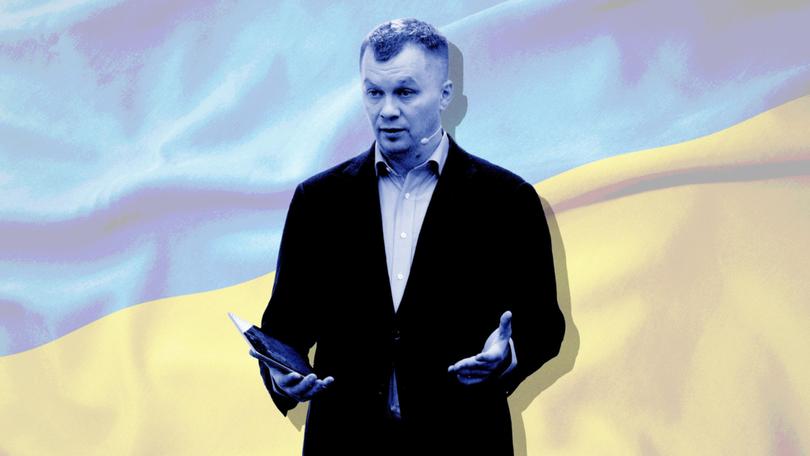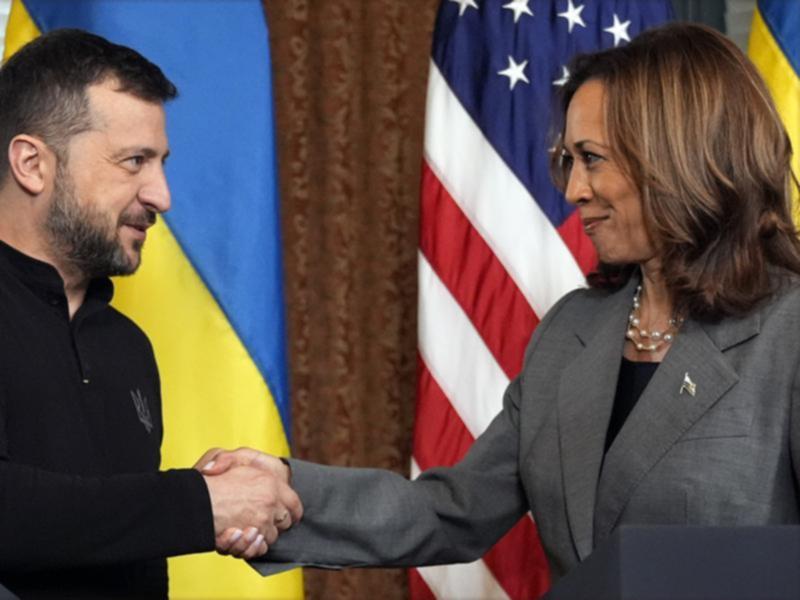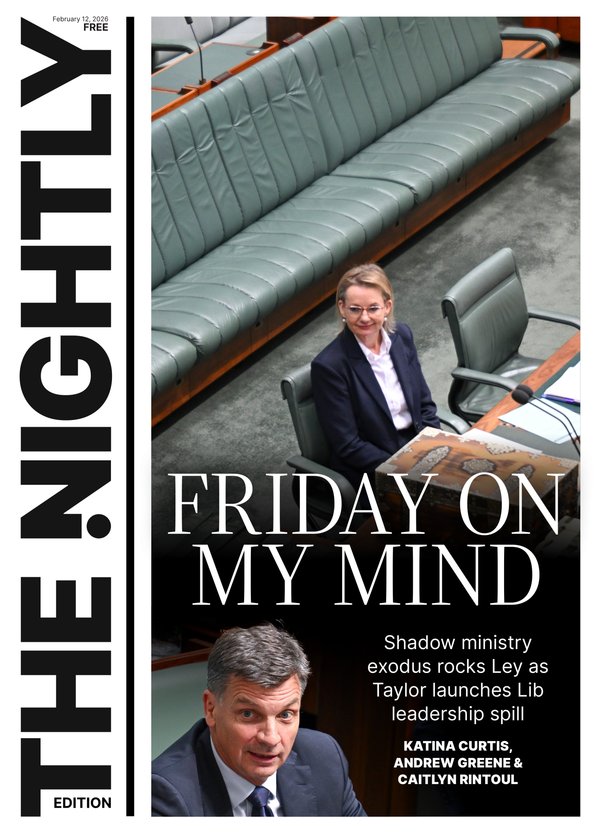LATIKA M BOURKE: Former Ukraine minister says Harris presidency could be just as bad as Trump for nation
One of Volodymyr Zelensky’s former ministers has weighed in on what the race for the White House will really mean for Kyiv as it faces Russia’s onslaught.

Ukraine’s former economy minister says a Trump White House may not necessarily be worse than a Kamala Harris presidency for his country given that any continuation of the Biden Administration’s approach to Ukraine would only lead to more deaths.
Americans vote on Tuesday, local time, in a Presidential race that analysts say could be one of the most consequential elections in US history with enormous geopolitical implications.
Mr Trump has frequently targeted US President Joe Biden’s foreign policy as weak and a failed strategy that has led to wars in the Middle East and Eastern Europe.
Sign up to The Nightly's newsletters.
Get the first look at the digital newspaper, curated daily stories and breaking headlines delivered to your inbox.
By continuing you agree to our Terms and Privacy Policy.But he has repeatedly expressed admiration for Russia’s leader Vladimir Putin as well as some of the authoritarian leaders fuelling the Kremlin’s war effort, including China’s Xi Jinping and North Korea’s Kim Jong-un, He has also vowed to end the war in 24 hours which is widely assumed to mean that he will force Ukraine to cede territory and potentially withdraw US military aid from Kyiv.
But in an exclusive interview with the Latika Takes podcast, Tymofiy Mylovanov who served as President Volodymr Zelensky’s Economy Minister and still maintains close ties to the Ukrainian government, said Mr Trump was “not necessarily” a worse option for Ukraine.
“Trump definitely is unpredictable for Ukraine and also for Russia and a lot of people believe his unpredictability actually gives him additional leverage,” the now-president of the Kyiv School of Economics said.
During his recent trip to the United States, President Volodymyr Zelensky met Mr Trump, despite Republican anger that the Ukrainian leader visited a munitions factory with leading Democrats in the key swing state of Pennsylvania in the middle of the Presidential election campaign.
Mr Trump and Mr Zelensky held a joint news conference on the right-wing news channel Fox News and the former US president has since touted his good relationship with the Ukrainian leader.
The United States is Ukraine’s biggest supplier of military aid but support in the Republican party is waning with much of the MAGA faction outright opposed to supporting Kyiv.

A recent book by the veteran US journalist Bob Woodward claimed Mr Trump had maintained contact with Mr Putin since leaving office, and the Wall Street Journal has reported that the Republican presidential candidate’s financial and media backer Elon Musk, whose social media platform X has exploded with disinformation since he took over, has also had secret conversations with Putin.
Asked if he was concerned about reports of Trump maintaining contact with Kyiv’s enemy, Mr Mylovanov said: “We shouldn’t over-amplify it.”
“What the US and others can do is to manage the number of lives lost,” he said.
“If Trump or Harris pull out support, more Ukrainians will die, more territory will be lost.”
He said Vice-President Kamala Harris had no clear answers when asked about her strategy for Ukraine and that if it was going to be more of the same, it would mean more deaths.
“If Kamala Harris, for example, decides to continue as is, actually this will entrench the war even more,” he said.
The Biden Administration has been slow to arm Ukraine with the weaponry it says it needs, including fighter jets, tanks and most recently refusing to grant it permission to use Western long-range missiles to hit targets inside Russia.
“What the current administration of the United States has done, in its desire to manage the conflict that it doesn’t spill over, it ensured that the conflict is entrenched,” Mr Mylovanov said.
“The Biden Administration recently has been truly non-committal and resistant to giving Ukraine sufficient capabilities to protect itself.
“And this is no way to end the war and this is no way to fight the war if you want to win.”
He said Harris had failed to set out her own vision for ending the war when asked since her last-minute elevation to become the Democrats nominee.
“She just said that Ukraine will not surrender and that we will continue to support it,” he said.
“When she was asked directly about NATO (membership for Ukraine) as an opportunity to get leverage or deterrence for Russia to stop the war, her answer was, ‘Well we’ll talk about it when we get to it’.”
“So even there, even purely speculatively, she could have said something, we need some deterrence for Russia – she doesn’t have to commit to NATO but she can talk about leverage over Russia.
“No, she just says we’re going to talk about it when we get time, so she’s absolutely non-committal.”
Ukraine’s President has recently published his plan for peace, after presenting it privately to the White House, Mr Trump, European leaders and Ukrainian MPs.
He wants security guarantees to protect his country against further Russian invasions, including NATO membership.
But NATO member heavyweights, the United States and Germany opposed granting Ukraine membership.
Mr Mylovanov said that NATO was not a silver bullet as while it could “subdue the conflict” and stop missiles flying over cities, it was not equipped to respond or deter hybrid warfare against an aggressive Russia that had more of Europe in its sights than just Ukraine.
On Monday, NATO Secretary-General Mark Rutte at a joint press conference with German Chancellor Olaf Scholz said Russia’s war had breached the Ukrainian front-line.
“Russia is conducting already an intensifying campaign of hybrid attacks across our Allied territories – interfering directly in our democracies, sabotaging industry and committing violence,” he said.
“All of this to weaken us and to sow divisions.
“This shows that the shifting front line in this war is no longer solely within Ukraine.
“Increasingly, the front line is moving beyond borders — to the Baltic region, to Western Europe and even to the High North.”
Mr Mylovanov said that Ukraine had suffered so much death that it was now personal for a huge rump of the population who wanted vengeance, compared to public opinion at the start of the full-scale invasion in February 2022.
“What’s not very well known is that Ukrainians were very enthusiastic about a peace agreement, or the possibility of a peace agreement at the beginning of the war,” he said.
“I remember conversations with some very high-level officials at the time where everyone was excited and convinced and enthusiastic about fast peace.
“It didn’t happen, I was very sceptical about this because that’s not how it works.
“So it is not true that Ukrainians do not want negotiations.”
But he said the recent mood change in Kyiv for talks, was not matched in Russia which was opposed to any negotiation and has been bolstering its war effort with the help of Iran and China, as well as North Korea, which is supplying the Kremlin with fresh troops.

